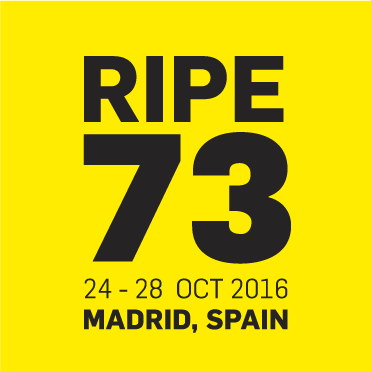Day two of RIPE 73 began with 571 attendees checked in and several presentations on some interesting academic research. The first three presenters, all from the Twente University (UTwente), reported on their work looking at the effectiveness of anycasting as a mechanism to increase the robustness of root DNS services. Their studies showed that anycast improves resilience against attacks, but also that an End User doesn’t necessarily reach the optimal service in an anycast cloud.
The session ended with a talk by Annie Edmundson from Princeton University, who investigated routing of End User traffic to several popular destinations, showing that a large percentage of traffic is routed through countries considered “surveillance states” and presented some suggestions on how this might be improved.
The second plenary session started with a talk by David Fernandez who discussed a broad variety of open source-based optimisation solutions, looking in particular at SolarWAN added algorithms and duplication. James Quinn followed with an inspiring presentation on how Facebook builds its Edge Network with a system called “Sonar”, which measures closeness from users to their edge networks. The final talk of the session covered Advanced Blackholing as an inexpensive first line of defence in mitigating DDoS attacks.
After lunch, Gregory Mounier from Europol explained law enforcement’s difficulties using whois data as part of criminal investigations. He explained that the data quality of RIPE NCC members was fine, but data relating to sub-assignments given to their customers was sometimes out of date or false. He asked the RIPE community to begin thinking about how it could solve this issue, and said he would be discussing this further in the Anti-Abuse WG on Thursday.
There was then a panel that looked at a the financial challenges of smaller IXPs – featuring SFMIX, LONAP, SwissIX, and SOX explaining their individual models. As many IXs grow organically from a single switch, it was noted that one of the biggest expenses in the early stages was coffee!
Hans Petter Holen, RIPE Chair, then presented on the process for the community to select his successor. The key point that was debated by audience members following his presentation was whether the community should use consensus or a voting system to make this decision. Hans Petter invited community members to continue the discussion on the dedicated ripe-chair-discuss [at] ripe [dot] net mailing list. There is also a Draft RIPE Chair Function Description that is also open to be commented upon.
In the final plenary session for the day – Ricardo Oliveira, ThousandEyes, looked at performance data from large-scale Internet outages and Richard Sheehan presented on Facebook’s approach to network fault detection and isolation. There were three lightning talks – Hans Petter Holen introduced the candidates for the Number Resource Organization (NRO) Number Council (NC) election and there was an update from Elise Gerich, IANA that was followed by Craig Thompson, Finisar looking at Open Optical Monitoring.
















